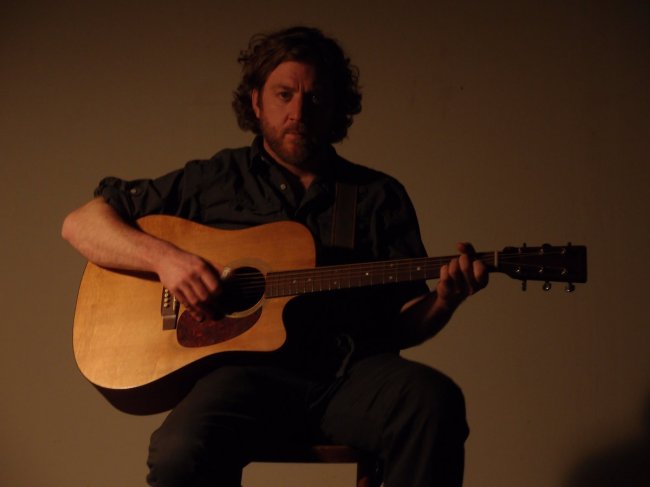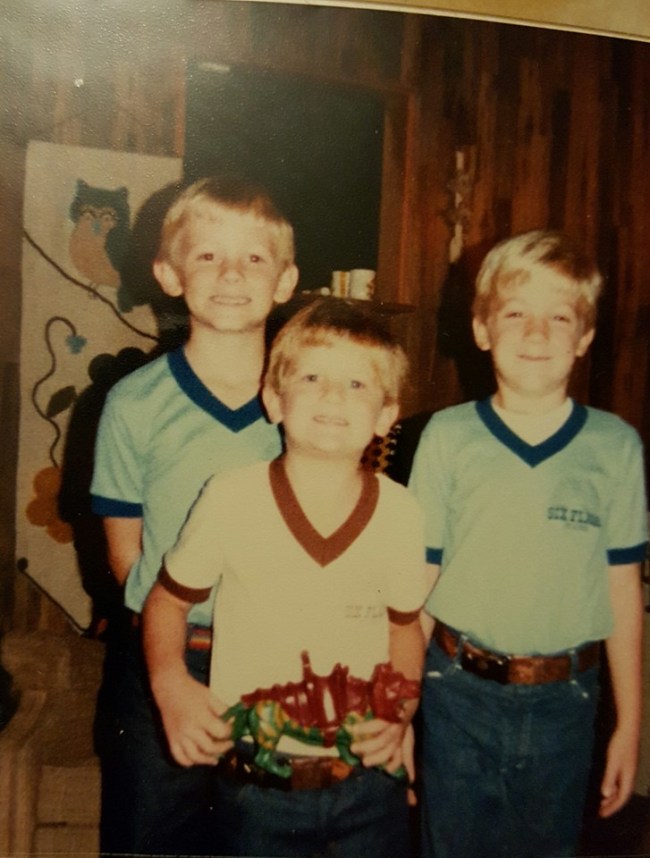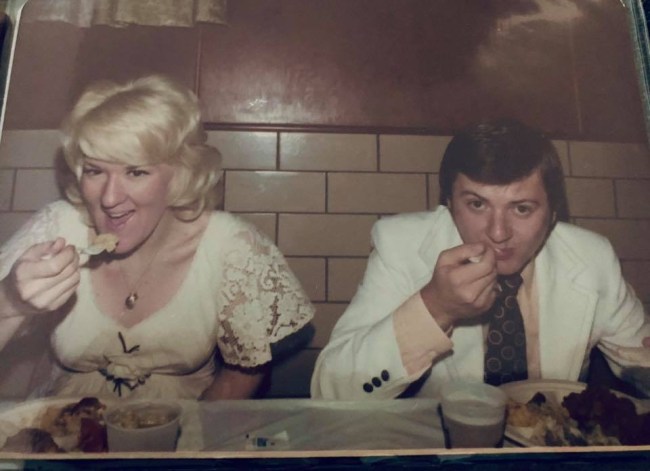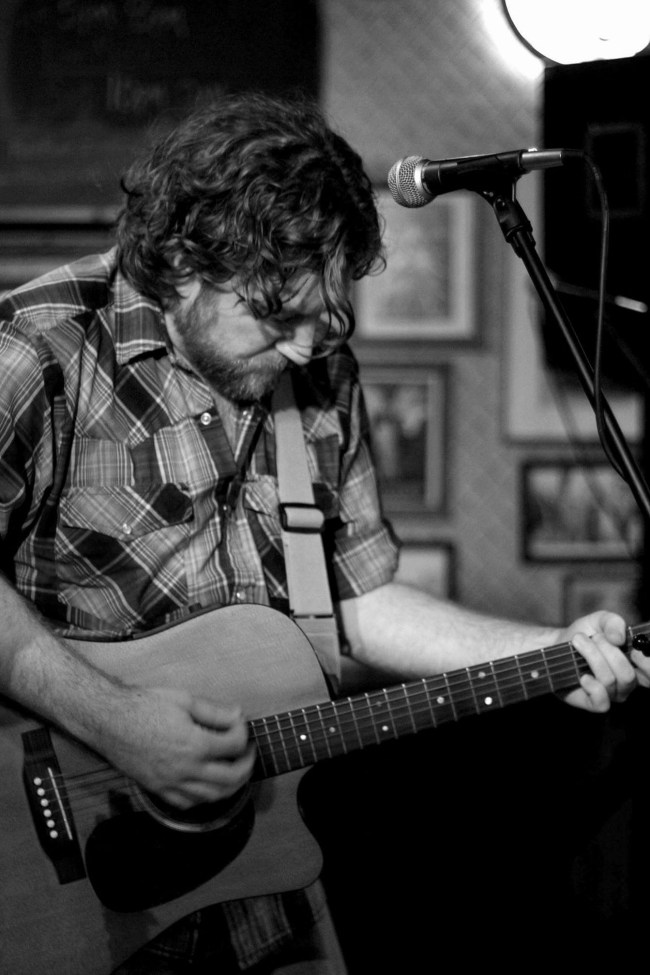
Dana Michael Anderson via Bandcamp
In August of 2023, JB Anderson—the founder and owner of Gaslight Studios in St. Louis—received what he refers to as “another one of those calls.” The voice on the other end claimed to be a coroner in Effingham, Illinois. He didn’t believe it, so he insisted on calling her back. But it was the coroner, informing JB that his younger brother Dana—a promising singer-songwriter—had taken his own life.
It was the final thread in a string of devastating tragedies over a decade that had struck the Andersons, which had grown up just across the river from St. Louis in Granite City, Illinois.
Dana’s death crystalized a vision for JB, centered around preserving a legacy that is ongoing.
“Having the experience of emptying out four houses,” he told me, his voice displaying no emotion while tears welled in his eyes. “I realized that legacy is all that matters.”
GROWING UP ANDERSON
JB was the eldest of three brothers, followed by Dana and Ryan. Like their neighbors in Granite City, the family was blue collar. Their mother, Sandy, operated a small hair salon from their laundry room. Earl, the father, worked in trucking.
Two things were ever-present in the Anderson household: Love and music. Sandy had a large record collection that included Elvis and the Beach Boys. She would play her records every morning as coffee brewed. Earl also loved music, with a passion for acts of the day like Chicago, Three Dog Night, and even Broadway musicals.
Early on, JB picked up on the Anderson family passion for music, hanging out at the local record store, diving into the red dirt sounds of the region as well as Seattle grunge. He would buy records and CDs, while Dana—13 months younger—spent hours reading the liner notes, absorbing lyrics.
JB would also go to local clubs such as Mississippi Nights to see bands like Uncle Tupelo, Blind Melon, Mathew Sweet, and take in several Lollapalooza shows in St. Louis. He would share all of these music experiences with Dana, who drifted largely into Midwest music reflecting the hardships of rural life.
“It was kid bar songs at first, largely projecting” JB said of Dana’s foray into songwriting. “You know, trucks and booze and whiskey. He became the guy at a campfire who would sing and play.”
Dana slowly began to build a following, playing gigs at local venues like the Jacobsmeyers Tavern and Stagger Inn. But he did get to tour Europe as an opening act for the Chicago band The Great Crusades, whose members JB befriended after college.
“He had the vocal tone to fit what was happening in Midwest Americana,” JB said of Dana, who went by Dana Michael Anderson,when performing. “He was a typical artist who was very much into the art, but had no interest in selling the product or promoting his music.”
Dana had absorbed a dark sense of humor from his parents that he used in his songwriting, reflected in songs like “Lipstick,” a social commentary about vanity, or “Opening Band,” poking fun of openers that audiences patiently wait for to get off the stage. But his music began to grow—demonstrated in the album Full Grown Child (originally released in 2012 but re-released in 2021)—where he essentially lampoons his own inability to mature. Then in his early 30s, Dana began to develop a reputation as a serious, viable songwriter in St. Louis music circles.
“Oh, I gotta have this guy,” recalled Steve St. Cyr, who founded and booked Dana to play at the Songbird Cafe Music Series in St. Louis, upon first hearing him play. “I knew right away that he was the real deal. Just an authentic kind of a voice, a really good storyteller, and he had kind of had a bit of a commanding presence in a laid back way. I just got to know him and liked him. He kind of opened the door to me to some female Nashville songwriters who I continued to have at Songbird for years.”
THE WHEELS FALL OFF
In 2014, things began to go awry for the Andersons. Sandy, the matriarch, had been secretly battling terminal cancer, succumbing to the disease in July, shocking all three sons. Later that year, Earl was diagnosed with cancer as well and passed away two days after Dana’s birthday in late December.
The parents gone, other than momentos, there really wasn’t anything except for a few bins of photos. But Earl did have some life insurance money, so upon his death, JB used some of it to create Gaslight Studios, the recording studio and bar in midtown-St. Louis that existed for seven years (between 2015-22).
“Gaslight was intended to be therapeutic, something the three of us could do together,” JB said. “We had nothing. No extended family that was close. It was something we could build together, and because it was music-based, it would help realize Dana’s dream to make music, while being able to run a studio.”
The studio was unique, providing a local, high quality recording outlet for fledgling bands, including my own, Atomic Junction, which recorded its first EP Gunshow at Gaslight. But it also was a bar and music venue that could make real-time recordings of live performances.

“Gaslight was one of those places that you had to experience for yourself to really understand and appreciate the concept,” noted St. Louis-area musician Vijoy Rao, founder of sustainable music instrument company Magic Room Brand. “I had friends and family ask me about it and I could never do it justice, and I’d say, ‘It’s a studio but also a venue but also a rehearsal space but also tacos and also sometimes musicians play on the dang roof. Just trust me and come to the show!’ That place was brand new to me the first 10 times I went in there.”
DANA’S FINAL ACT
As Dana’s music career progressed, his songwriting became more poignant and refined, using deeply impactful life experiences including the death of both parents and a divorce. At the same time, the youngest Anderson brother, Ryan, began isolating himself. Finally, however, after six months of separation, Ryan reached out via text and suggested the three brothers meet for breakfast. However, before they could meet, Ryan died of a sudden heart attack.
“I had to tell his two kids and our one aunt,” JB recalled. “I had to go empty Ryan’s house, which was a disaster, and it was depressing thinking about just how fucked up he was.”
Dana and JB began discussing legacy after emptying Ryan’s home.
“He understood the value of legacy because he would create things that would live in perpetuity,” JB said of Dana. “When we cleaned out Ryan’s house, he realized Ryan’s legacy behind the scenes was largely destruction and chaos, and we weren’t raised that way.”
This had a resounding impact as Dana, according to JB, and he started to gravitate towards people who were legitimately trying to help him—something he had not done often enough prior.
“He was in a good place. He continued to write. He was a master at laying down a melody. The songs were just better, more mature, more relevant. It was all just a byproduct of his everyday life that would free-flow out of his own conscience.”
JB and Dana became even more close. Dana began taking trips with JB’s family—he and his wife and their three children—and Dana would attend local games and events in support of the kids. But then, out of nowhere, came the call.
CREATING A LEGACY
After the call from the Effingham coroner, JB had to identify the body and empty yet another house.
“You could smell it,” he remembered when he first walked into Dana’s home after Dana had taken his life there. “Everything was clean. Songs stacked up. There was an empty bottle of vodka on the table and he had not been drinking for years. On top of his Gibson case were lyrics for his song, “Fortune Teller’s Blues,” that were the only things that seemed “out of place.” A new piece was on the painting easel and there were the remnants and signs of where he finally fell in his bedroom.”
There was no indication as to why Dana took his life and no foreign substances detected in the toxicology report. But JB knew there was material and songs. There was a legacy for Dana.

via JB Anderson, with permission
“When I got into his iPad, I found everything neatly stored,” JB noted. “It was an historical narrative of Dana.”
That’s when JB made up his mind to release Dana’s music, although the only vocals were control room takes. Just Dana, standing behind the board, playing guitar, while other instruments were tracked. The effort, JB said, is one part therapeutic, one part project with his son, Keller—a music student at Belmont College in Nashville. Together, they are creating a publishing company in support of Dana’s art in an effort to secure his legacy.
“Having the experience of emptying out four houses now, legacy is all that matters,” JB says. “My parents had a house full of worthless stuff. With Ryan having left a tainted legacy in that house for Dana and I to address, I couldn’t accept that. So, with Dana being the creative and songwriter, it’s a way to move past the sympathy. When you have a loss, there’s a hole in your heart and soul because they are gone. I’m attempting to create a new bundle of memories for myself and others to backfill that hole. The goal is to not let that die.”
In August of 2023, JB Anderson—the founder and owner of Gaslight Studios in St. Louis—received what he refers to as “another one of those calls.” The voice on the other end claimed to be a coroner in Effingham, Illinois. He didn’t believe it, so he insisted on calling her back. But it was the coroner, informing JB that his younger brother Dana—a promising singer-songwriter—had taken his own life.
It was the final thread in a string of devastating tragedies over a decade that had struck the Andersons, which had grown up just across the river from St. Louis in Granite City, Illinois.
Dana’s death crystalized a vision for JB, centered around preserving a legacy that is ongoing.
“Having the experience of emptying out four houses,” he told me, his voice displaying no emotion while tears welled in his eyes. “I realized that legacy is all that matters.”
GROWING UP ANDERSON
JB was the eldest of three brothers, followed by Dana and Ryan. Like their neighbors in Granite City, the family was blue collar. Their mother, Sandy, operated a small hair salon from their laundry room. Earl, the father, worked in trucking.
Two things were ever-present in the Anderson household: Love and music. Sandy had a large record collection that included Elvis and the Beach Boys. She would play her records every morning as coffee brewed. Earl also loved music, with a passion for acts of the day like Chicago, Three Dog Night, and even Broadway musicals.
Early on, JB picked up on the Anderson family passion for music, hanging out at the local record store, diving into the red dirt sounds of the region as well as Seattle grunge. He would buy records and CDs, while Dana—13 months younger—spent hours reading the liner notes, absorbing lyrics.
JB would also go to local clubs such as Mississippi Nights to see bands like Uncle Tupelo, Blind Melon, Mathew Sweet, and take in several Lollapalooza shows in St. Louis. He would share all of these music experiences with Dana, who drifted largely into Midwest music reflecting the hardships of rural life.
“It was kid bar songs at first, largely projecting” JB said of Dana’s foray into songwriting. “You know, trucks and booze and whiskey. He became the guy at a campfire who would sing and play.”
Dana slowly began to build a following, playing gigs at local venues like the Jacobsmeyers Tavern and Stagger Inn. But he did get to tour Europe as an opening act for the Chicago band The Great Crusades, whose members JB befriended after college.
“He had the vocal tone to fit what was happening in Midwest Americana,” JB said of Dana, who went by Dana Michael Anderson,when performing. “He was a typical artist who was very much into the art, but had no interest in selling the product or promoting his music.”

Dana had absorbed a dark sense of humor from his parents that he used in his songwriting, reflected in songs like “Lipstick,” a social commentary about vanity, or “Opening Band,” poking fun of openers that audiences patiently wait for to get off the stage. But his music began to grow—demonstrated in the album Full Grown Child (originally released in 2012 but re-released in 2021)—where he essentially lampoons his own inability to mature. Then in his early 30s, Dana began to develop a reputation as a serious, viable songwriter in St. Louis music circles.
“Oh, I gotta have this guy,” recalled Steve St. Cyr, who founded and booked Dana to play at the Songbird Cafe Music Series in St. Louis, upon first hearing him play. “I knew right away that he was the real deal. Just an authentic kind of a voice, a really good storyteller, and he had kind of had a bit of a commanding presence in a laid back way. I just got to know him and liked him. He kind of opened the door to me to some female Nashville songwriters who I continued to have at Songbird for years.”
THE WHEELS FALL OFF
In 2014, things began to go awry for the Andersons. Sandy, the matriarch, had been secretly battling terminal cancer, succumbing to the disease in July, shocking all three sons. Later that year, Earl was diagnosed with cancer as well and passed away two days after Dana’s birthday in late December.
The parents gone, other than momentos, there really wasn’t anything except for a few bins of photos. But Earl did have some life insurance money, so upon his death, JB used some of it to create Gaslight Studios, the recording studio and bar in midtown-St. Louis that existed for seven years (between 2015-22).
“Gaslight was intended to be therapeutic, something the three of us could do together,” JB said. “We had nothing. No extended family that was close. It was something we could build together, and because it was music-based, it would help realize Dana’s dream to make music, while being able to run a studio.”
The studio was unique, providing a local, high quality recording outlet for fledgling bands, including my own, Atomic Junction, which recorded its first EP Gunshow at Gaslight. But it also was a bar and music venue that could make real-time recordings of live performances.
“Gaslight was one of those places that you had to experience for yourself to really understand and appreciate the concept,” noted St. Louis-area musician Vijoy Rao, founder of sustainable music instrument company Magic Room Brand. “I had friends and family ask me about it and I could never do it justice, and I’d say, ‘It’s a studio but also a venue but also a rehearsal space but also tacos and also sometimes musicians play on the dang roof. Just trust me and come to the show!’ That place was brand new to me the first 10 times I went in there.”
DANA’S FINAL ACT
As Dana’s music career progressed, his songwriting became more poignant and refined, using deeply impactful life experiences including the death of both parents and a divorce. At the same time, the youngest Anderson brother, Ryan, began isolating himself. Finally, however, after six months of separation, Ryan reached out via text and suggested the three brothers meet for breakfast. However, before they could meet, Ryan died of a sudden heart attack.
“I had to tell his two kids and our one aunt,” JB recalled. “I had to go empty Ryan’s house, which was a disaster, and it was depressing thinking about just how fucked up he was.”
Dana and JB began discussing legacy after emptying Ryan’s home.
“He understood the value of legacy because he would create things that would live in perpetuity,” JB said of Dana. “When we cleaned out Ryan’s house, he realized Ryan’s legacy behind the scenes was largely destruction and chaos, and we weren’t raised that way.”
This had a resounding impact as Dana, according to JB, and he started to gravitate towards people who were legitimately trying to help him—something he had not done often enough prior.
“He was in a good place. He continued to write. He was a master at laying down a melody. The songs were just better, more mature, more relevant. It was all just a byproduct of his everyday life that would free-flow out of his own conscience.”
JB and Dana became even more close. Dana began taking trips with JB’s family—he and his wife and their three children—and Dana would attend local games and events in support of the kids. But then, out of nowhere, came the call.
CREATING A LEGACY
After the call from the Effingham coroner, JB had to identify the body and empty yet another house.
“You could smell it,” he remembered when he first walked into Dana’s home after Dana had taken his life there. “Everything was clean. Songs stacked up. There was an empty bottle of vodka on the table and he had not been drinking for years. On top of his Gibson case were lyrics for his song, “Fortune Teller’s Blues,” that were the only things that seemed “out of place.” A new piece was on the painting easel and there were the remnants and signs of where he finally fell in his bedroom.”
There was no indication as to why Dana took his life and no foreign substances detected in the toxicology report. But JB knew there was material and songs. There was a legacy for Dana.
“When I got into his iPad, I found everything neatly stored,” JB noted. “It was an historical narrative of Dana.”
That’s when JB made up his mind to release Dana’s music, although the only vocals were control room takes. Just Dana, standing behind the board, playing guitar, while other instruments were tracked. The effort, JB said, is one part therapeutic, one part project with his son, Keller—a music student at Belmont College in Nashville. Together, they are creating a publishing company in support of Dana’s art in an effort to secure his legacy.
“Having the experience of emptying out four houses now, legacy is all that matters,” JB says. “My parents had a house full of worthless stuff. With Ryan having left a tainted legacy in that house for Dana and I to address, I couldn’t accept that. So, with Dana being the creative and songwriter, it’s a way to move past the sympathy. When you have a loss, there’s a hole in your heart and soul because they are gone. I’m attempting to create a new bundle of memories for myself and others to backfill that hole. The goal is to not let that die.”